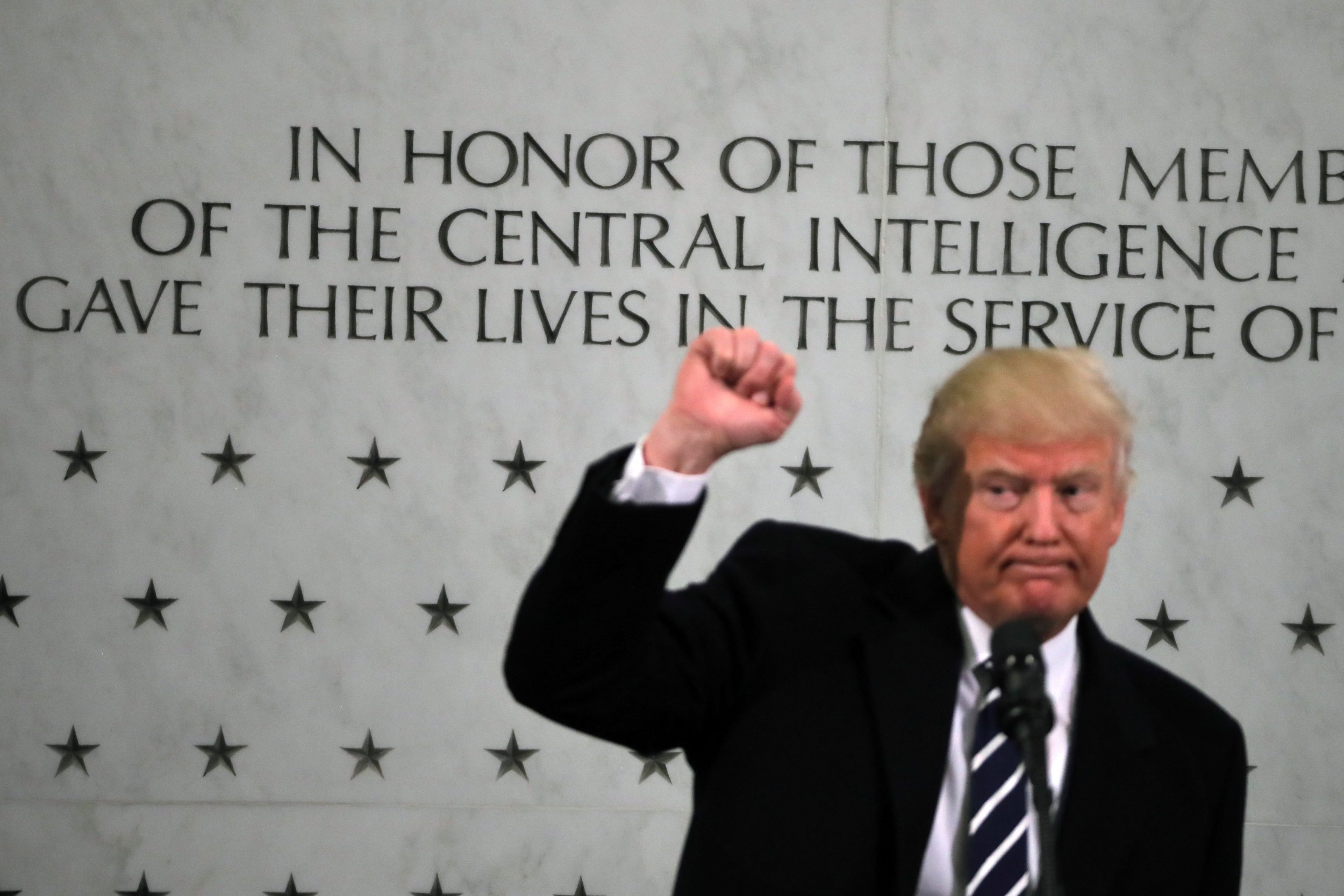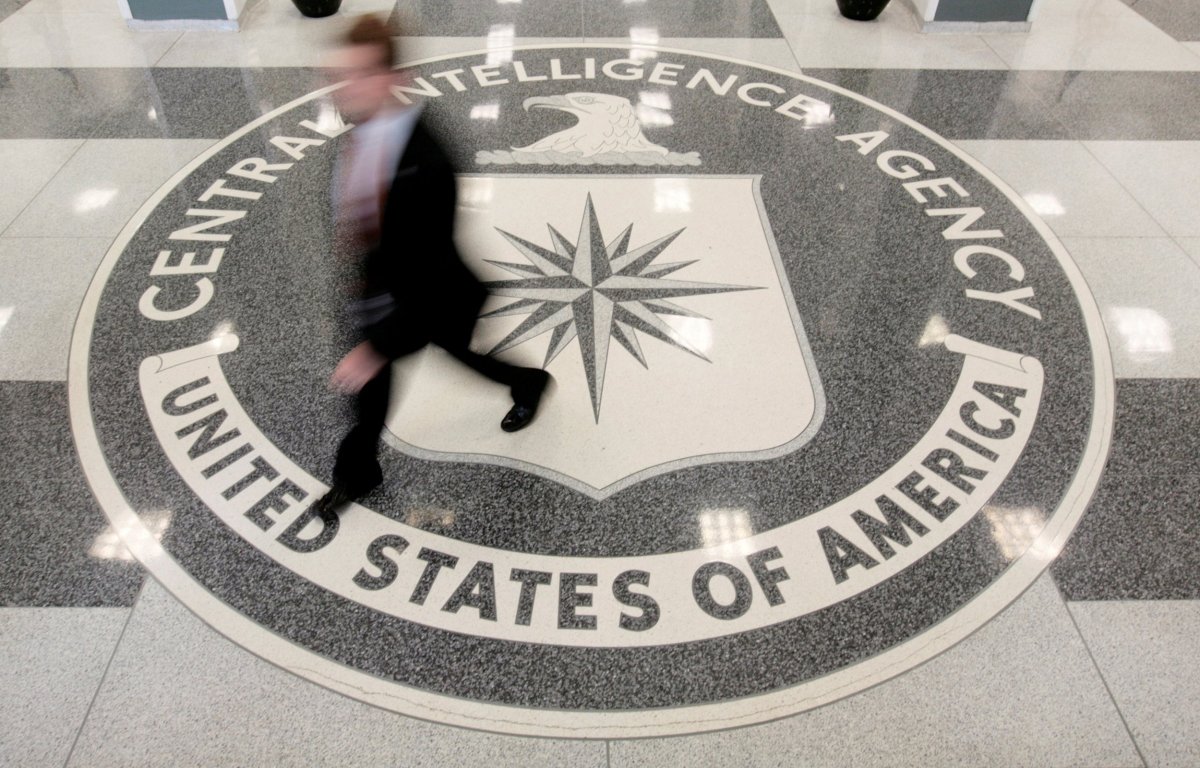
President Donald Trump's temporary ban on immigrants from seven Muslim-majority nations takes a major recruiting tool out of the hands of U.S. spy handlers, say a growing number of intelligence veterans.
For decades, CIA and U.S. military intelligence spy recruiters have held out the promise of eventual resettlement in America to induce foreigners to turn coat and work secretly for the United States against terrorist groups or repressive governments. In reality, many were caught before they ever made it, but during the Cold War countless Eastern Europeans living under communist rule, and more recently, Muslims across the Middle East, North Africa and Central Asia, have worked secretly for U.S. spy agencies on the promise that they or their children would eventually be extracted. Another effective recruiting tool for U.S. operatives has been to offer their agents' families medical care or education in the United States.
RELATED: Trump's campaign-style CIA visit aims to bury feud
Those inducements, a primary recruiting tool in Muslim lands, were effectively suspended with Trump's executive order Friday to temporarily ban immigration from seven critical targets of U.S. spy agencies—Iraq, Iran, Syria, Yemen, Sudan, Libya and Somalia. The departments of State and Homeland Security, the order stipulates, may allow entry from those countries on "a case-by-case basis," but it's a balky arrangement not likely to appeal to managers of the CIA's highly secretive operations directorate, its espionage and covert action arm.
Intelligence veterans with vast counterterrorism experience are expressing dismay about how the order will affect their spy operations.
Countries Unlikely to Collaborate
"These individuals often put themselves at the risk of death for working with the U.S. and without the ability to offer them safety, we will be reducing the likelihood that those in countries targeted by the ban will work with us in the future," Phillip Lohaus, a decorated veteran of the U.S. Special Operations Command and CIA, tells Newsweek .
"We relied heavily on local translators, many of whom have gone on to forge productive lives for themselves here in the States," Lohaus added. "Why would they take such a risk if they knew that they would face retribution or death by staying in their home countries?"
"Absolutely," agreed Cindy Storer, a former member of the CIA intelligence team that tracked al-Qaeda leader Osama Bin Laden. "It hurts," she said in a brief interview. "Capital h-u-r-t-s."
Imagine, she said, if the ban had been in place when Jamal al Fadl, a Sudanese Muslim and key al-Qaeda operative, showed up at the American embassy in Eritrea in the mid-1990s and volunteered to "defect" to the United States. FBI counterterror agents brought him into the U.S., where he provided "a major breakthrough of intelligence on the creation, character, direction, and intentions of al-Qaeda," according to the official 9/11 Commission report.
Ironically, says Robert McFadden, a former deputy assistant director of national security operations for the NCIS, or Naval Criminal Investigative Service, "None of the 9/11 hijackers had passports from any" of the countries on Trump's exclusionary list. Moreover, the visa ban does not include Saudi Arabia, Egypt, Lebanon or the United Arab Emirates—the origins of the 9/11 hijackers. The Tsarnaev brothers who carried out the Boston Marathon attack came from Russia. The deceased San Bernardino attacker Syed Rizwan Farook was a U.S. citizen of Pakistani origin. His wife, Tashfeen Malik, was Pakistani but lived most of her life in Saudi Arabia. Pakistan, which has harbored al-Qaeda, and other terror groups, is also not on Trump's list.
Vetting Already Thorough
The president's order banning all Syrian refugees is based on a theory he frequently propounded on the campaign trail: that the refugee stream offers Islamic State (ISIS) militants an easy route into the United States.
But intelligence veterans like Henry Miller-Jones, a retired CIA operations officer who worked in the Middle East, scoff at that idea.
"ISIS would never be likely to use such a route and risk losing a valuable potential asset in a rubber dinghy before he even arrived in a target territory," Miller-Jones tells Newsweek. "Then there is the wait for them in Europe, and the Europeans do some vetting themselves now." The point, Miller-Jones says, is that "these refugees are already vetted pro forma very thoroughly. There is room to be more thorough, but not much, and more will not improve our security for the cost."
As for a route through Mexico, "the handful of refugees who might be coming over the southern border illegally or legally aren't worth" a ban, he says. "To risk getting caught or dying in the desert in order to blow up a car somewhere and maybe kill a few people would be foolish and the ISIS leadership is not stupid."

Miller-Jones also said the ban would likely damage the flow of intelligence from contacts with "Muslim-country students, professors, visiting businessmen and others from whom [CIA officers] attempt to develop sources or debrief." The same goes for intelligence from "American businessmen who travel and work in the Muslim world" but now "may get the cold shoulder" now from valuable contacts there.
Iran on Saturday announced it was going to refuse entry to U.S. citizens in retaliation to Washington's visa ban against Tehran and six other majority-Muslim countries, throwing another roadblock to U.S. spies.
'Disastrous Mistake'
All in all, the Trump order could pose a serious setback for U.S. intelligence and damage the very effort the president says he's making: to reduce the chance of a terrorist attack from abroad, the ex-spies and security officials say.
"From an intelligence, operations, and foreign liaison perspective, there will most certainly be a profound chilling effect, with respect to developing contacts, recruiting sources, and working with foreign counterparts..." says McFadden, who also served on the experts panel for Detainee Interrogation, Detention, and Rendition policy in the office of the Director of National Intelligence.
During his many tours of duty in the Middle and Near East, "It was at times extraordinarily difficult to explain to a potential cooperative person or liaison counterpart that, 'Yes, I and my country do respect your religion, culture, your people…' when from D.C. the opposite was the case." But, McFadden adds, "I never encountered anything on the scale of what's going on now with this executive order on immigration and the refugee stand down and what the new president and those in his circle are saying about Islam and a large part of the Middle East."
Adam Schiff of California, the ranking Democrat on the House Intelligence Committee, called Trump's order "a disastrous mistake that will alienate the Muslim world while not making us any safer." In a brief telephone interview, he said, "it plays right into the ISIS narrative" that America is at war with Muslims.
Trump said Saturday that persecuted Christians would be given priority over other refugees, saying they have been "horribly treated...so we are going to help them."
Widespread outrage and mass confusion greeted Trump's signing of the visa ban on Friday, as hundreds of Muslim travellers found themselves stranded at airports and separated from their families. But on Saturday the president said it was "working out very nicely.
"You see it at the airports. You see it all over," Trump said during an Oval Office photo opportunity. "It's working out very nicely and we're going to have a very, very strict ban, and we're going to have extreme vetting, which we should have had in this country for many years."
Uncommon Knowledge
Newsweek is committed to challenging conventional wisdom and finding connections in the search for common ground.
Newsweek is committed to challenging conventional wisdom and finding connections in the search for common ground.
About the writer
To read how Newsweek uses AI as a newsroom tool, Click here.








